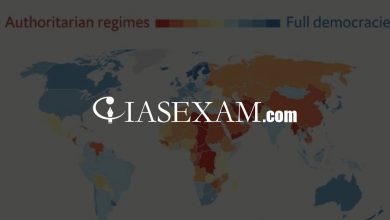Climate change threatens around half of world GDP: WEF Study
A recent analysis of 163 industry sectors and their supply chains found that over half of the world’s GDP is moderately or highly dependent on nature and its services. Releasing the Nature Risk Rising Report ahead of its 50th Annual Meeting, the World Economic Forum said about 25 per cent of our assessed plant and animal species are threatened by human actions, with a million species facing extinction, many within decades. China, the EU and the US have the highest absolute economic value in nature-dependent industries.
Flagging huge risks to the economy from dangers of biodiversity loss and climate change, the WEF study said businesses are more than dependent on nature with an estimated exposure of $44 trillion or half of the world GDP.
Highlights of the Report
- The report said $44 trillion of economic value generation — over half the world’s total GDP — is moderately or highly dependent on nature and its services and, as a result, exposed to risks from nature loss.
- Construction ($4 trillion), agriculture ($2.5 trillion) and food and beverages ($1.4 trillion) are the three largest industries that depend most on nature. Such industries rely on either the direct extraction of resources from forests and oceans or the provision of ecosystem services such as healthy soils, clean water, pollination and a stable climate.
- As nature loses its capacity to provide such services, these industries could be significantly disrupted. Industries highly dependent on nature generate 15 per cent of global GDP ($13 trillion), while moderately dependent industries generate 37 per cent ($31 trillion).
- The report, produced in collaboration with PwC UK, found that many industries have significant “hidden dependencies” on nature in their supply chain and may be more at risk of disruption than expected.
- For instance, there are six industries which have less than 15 per cent of their direct gross value added (GVA) that is highly dependent on nature, yet over 50 per cent of their supply chains’ GVA is highly or moderately nature-dependent. The industries are chemicals and materials; aviation, travel and tourism; real estate; mining and metals; supply chain and transport; and retail, consumer goods and lifestyle.
- In terms of global exposure, larger economies have the highest absolute amounts of GDP in nature-dependent sectors: $2.7 trillion in China, $2.4 trillion in the European Union and $2.1 trillion in the United States. This means even regions with a relatively lower share of their economy at high exposure to nature loss can hold a substantial share of the global exposure and, therefore, cannot be complacent.
About World Economic Forum (WEF)
The World Economic Forum (WEF), based in Cologny-Geneva, Switzerland, is an NGO, founded in 1971. The WEF’s mission is cited as “committed to improving the state of the world by engaging business, political, academic, and other leaders of society to shape global, regional, and industry agendas”. It is a membership-based organization, and membership is made up of the world’s largest corporations.
The WEF hosts an annual meeting at the end of January in Davos. The meeting brings together some 3,000 business leaders, international political leaders, economists, celebrities and journalists for up to five days to discuss global issues, across 500 public and private sessions.
SOURCE: Business Standard, Wikipedia





.png)



